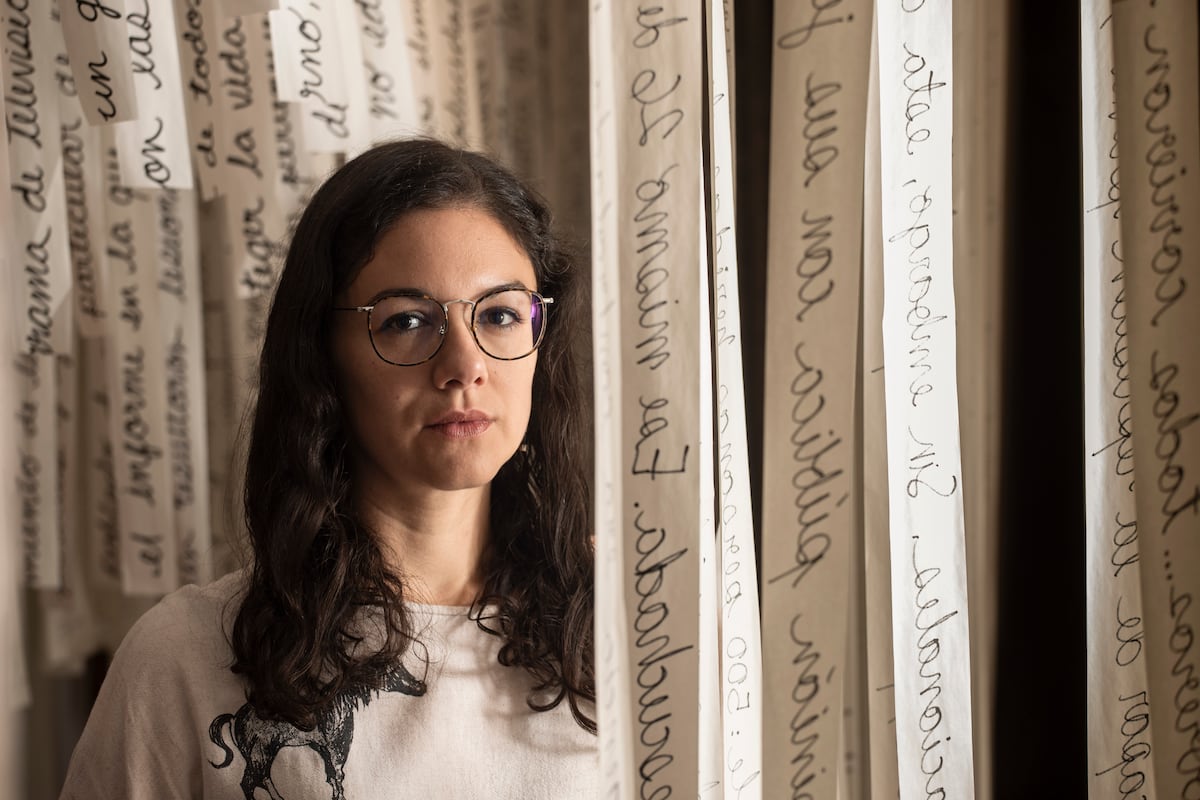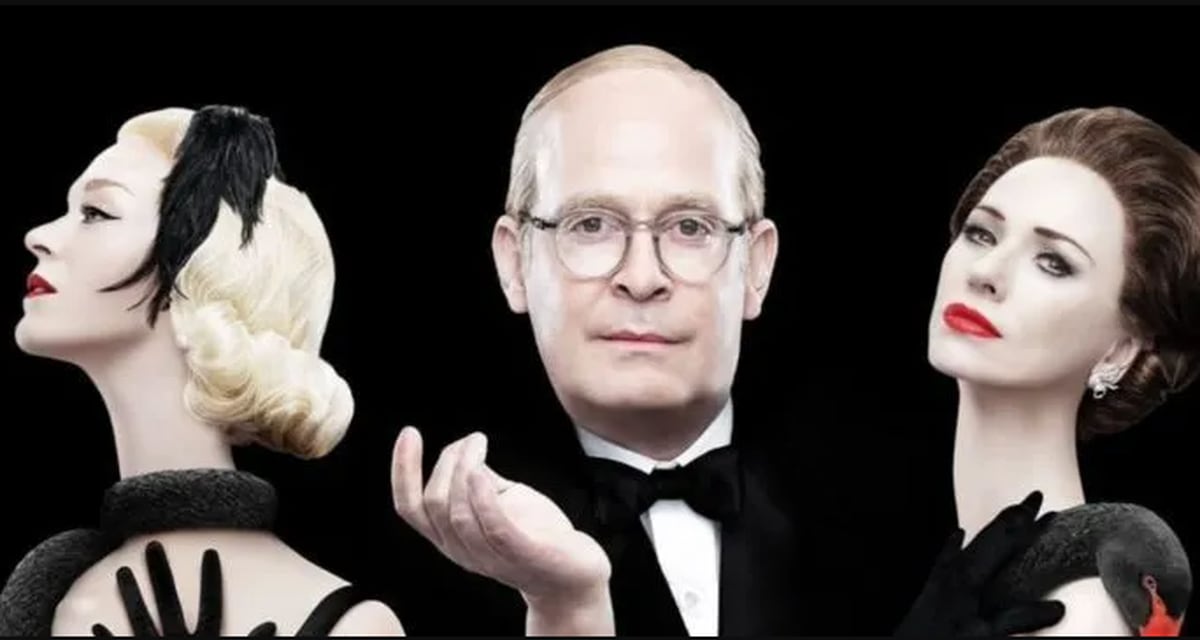Héctor Abad Faciolince, last week in Madrid.Olmo Calvo
Héctor Abad Faciolince (Medellín, Colombia, 62 years old) keeps in his eyes that stupor that, when he was 27 years old, marked his life: the murder of his father in Medellín.
It was August 25, 1987. Some time later he came to Spain to present some of his first books
(Basura, Treatise on culinary arts for sad women…).
That cloud persisted and one day a book was made,
The forgetfulness that we will be
(Alfaguara, 2006), where that boy wounded by the memory of that day in Medellín overturned everything that until then was stirring the indelible memory.
That story is now also a movie, directed by Fernando Trueba and which will be released soon.
While the most tremendous story of his life was being filmed, he gave his editors the book of his diaries (1985-2006), which has remained confined in Spain due to the pandemic, as it had to have been presented just a year ago.
We
talked to him about
those newspapers
(What was present,
also in Alfaguara) at the Comercial café in Madrid.
Héctor Abad Faciolince reveals his darkest secrets
Ask.
How has it been related to time in these years?
Answer.
I remember when I turned 18, the age of majority.
That already seemed tremendous to me.
When I turned 54 I said at home that I was not going to turn anymore and every October 1 they tell me: “Happy 54”.
My father was killed when he was close to 66, I was 27. I don't know to what extent that moment breaks or interrupts my life.
Hamlet says that he is going to forget, to erase everything from his memory to only remember a murder.
In my old photos I don't look like the first child, not the 20-year-old, not even the one from ten years ago.
Everything changes in me.
The difficult thing is to maintain an identity over time.
It's very weird.
Forgetting is forgetting what happened, which is combined [as in Irene Vallejo's book
The Past That Awaits You]
with a future that has not happened.
When does what happened in the past suddenly come back and dominate the whole present?
P.
To top it off, until now this book of your diaries has lived confined by the pandemic ...
R.
For many things that have happened, this is the strangest year of our lives.
The newspaper could never have been presented in Colombia because the first time we tried it there was a national strike.
In Madrid it was going to be presented on March 14, 2020, the day they closed everything.
My friend Gonzalo Córdoba, producer of the Trueba film, did not want me to publish them, because it did not suit me.
And he said, when he knew that no one was going to find him: “It's the best thing that could have happened to you;
You don't want them to read your diaries ”.
He knows that there I tell the truth, and in some way Gonzalo wants to protect me from people confusing me with the protagonist of
The forgetfulness that we will be,
that many deduce that I have the kindness of Dr. Héctor Abad Gómez, because that character has brought me many friends, and he believes that here it seems clearly that I am not.
I think so too.
In this book you can see that we are two people, the one from the newspapers and the one from the book;
from the deck you can see that I myself am two individuals.
I am not a luminous being, but a person with a complex life, with chiaroscuro;
I am not a good doctor who fights for others, but someone very closed up, struggling with writing and with a destiny of my own, but at the same time dictated by my dad.
Before they killed him, I heard a phrase that he said to his friends: "I will be remembered for having been Héctor Joaquín's father," that's what my name is.
That phrase became after the murder a blessing and a condemnation: my mission was that my father was remembered.
The words of parents or someone you love very much are like blessings or curses and my destiny as a writer was a bit like that.
My dad was killed when he was close to 66, I was 27. I don't know to what extent that moment breaks or interrupts my life
Q.
"The book is a portrait of Colombia, not just the self-portrait of a person making himself", his friend Carlos Gaviria told him when he read the newspapers.
A.
I didn't mean to.
I am not a sociologist or political scientist or anthropologist.
I'm just one who tells stories, and generally very intimate.
But the story often sneaks into the intimate story, more in this case where it intersects with my life.
If that crossing had not happened like this, so brutal, I would have been another writer, perhaps unfortunately more frivolous.
I wrote two more frivolous books after my dad died;
perhaps it was to walk the path to an inevitable book.
I would have liked to be a writer of many books, but more and more I realize that I am a writer of only one.
I wonder if it would not have been better if I had written a single book and that's it, and then have dedicated myself to drinking and not writing more.
P.
Twenty years ago you wrote in your diary: "Yes, I'm going to write a book about my dad."
Already then he was a writer, he met others, such as García Márquez or Vargas Llosa.
He was already an old person.
What did you think of that life?
R.
I am obsessed with two types of writers: the failure and the success.
You've mentioned two successful ones who at some point in their lives had failures.
A failed writer like Irene Vallejo would have been, who was going to quit writing because she couldn't do it anymore, she had no way to earn a living writing ... I was a failed and drunk writer, that's why I have a lot of affection for a failed writer.
Umberto Eco used to say that there are no great unknown books, but great posthumous books, like
El Gatopardo.
Joseph Roth's books are successful when he is already dying of
delirium tremens
in Paris and without money.
In a middle ground is Onetti: you don't know which is one of those guys I'm telling you about.
Life has allowed me to be a failure in all my books and a successful writer in one.
I don't know which of the two I like better!
[laughs].
I would have liked to be the author of many books, but I realize that I am the writer of only one
Q. You
tell in your diaries about your various encounters with García Márquez ...
R.
I was lucky to see Borges in an interview and to have met García Márquez, yes.
With both, I had the feeling of being before two immense geniuses of the Latin American golden age.
I thought: if Homer existed, surely those who saw the literary heaven in Homer would feel what I was feeling for both of them.
When I met García Márquez he was too successful a writer and too aware that he had it.
As he had been poor and always on the eve of being a failed writer, he turned a little against him, especially in Cuba, not so in Mexico or Colombia.
In Cuba it was like a new rich man, one of those who earn a lot of money and suddenly dress in white and have a house and car of the same color.
And there was Fidel, with his shoes raised to look like 1.90, so that there would be no one taller at the meeting.
It seems dramatic to me that one exaggerates what it is not.
And I only knew that Fidel… My father had sympathy and respect for him.
Not me: he was very brave, but it seems to me that he continued to be arrogant, taking revenge for something from the past.
However, García Márquez is vindicated within me.
Q. You
write this line in your journals: “I had the perfect dad to give everything I have given, but I am not capable of giving more.
He would forgive me.
I don't forgive myself ”.
After time and at 62, what line would you dedicate today?
R.
As a child and adolescent, they teach us a lot to obey and forgive.
What we have to learn in life is not to obey and to forgive ourselves.
Against what I wrote in the newspaper, I think I am learning to forgive myself, not to obey the permanent lesson of self-blame and criticism, very Catholic, in order to forgive myself.

/cloudfront-eu-central-1.images.arcpublishing.com/prisa/4MGPGEKPWZAL5FL4MDL763QZ6I.jpg)



/cloudfront-eu-central-1.images.arcpublishing.com/prisa/UQQAU7OV6RA6HGJD6NM2HD2PEE.jpg)









